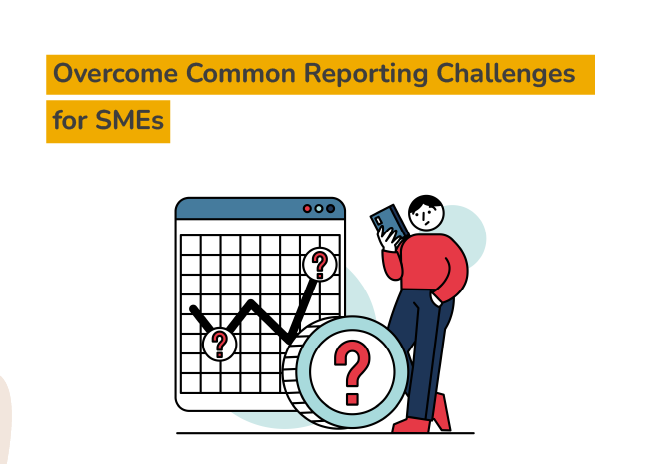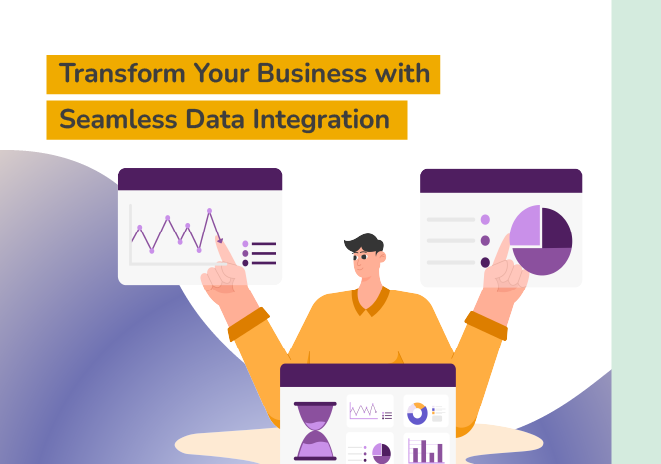What are the common reporting challenges faced by SMEs?
Small and medium enterprises (SMEs) often encounter
reporting challenges due to restricted resources, ensuring data
accuracy, and handling multiple data
sources. These challenges can hinder effective decision-making and growth. SMEs typically struggle with allocating sufficient time and finances to enhance their reporting frameworks. The diversity in data sources further complicates consolidation, making it crucial for SMEs to adopt efficient strategies to streamline these processes.
Key Takeaways
- SMEs face reporting challenges mainly due to limited resources and diverse data sources.
- Implementing data validation techniques and regular audits enhance data accuracy and reliability for SMEs.
- Leveraging the right automation tools can streamline SME reports by reducing manual errors and saving time.
- Centralizing data and using cloud solutions help SMEs efficiently manage diverse sources, enhancing reporting accuracy.
- Understanding and keeping abreast of industry-specific regulations are crucial for SMEs to ensure compliance in reporting.
- By focusing on essential reports, SMEs can allocate their limited resources more effectively.
- Improving reporting practices enables SMEs to make better strategic decisions and maintain a competitive edge in the market.
Understanding limited resources
For small and medium enterprises (SMEs), navigating the challenge of
limited resources in reporting processes can be daunting. Without ample budget or manpower, efficient reporting might seem out of reach. However, prioritizing essential reports, outsourcing tasks, and using affordable reporting tools can significantly mitigate these constraints, allowing SMEs to focus on core business activities.
Managing data accuracy
Accurate data is the foundation of effective reporting for
SMEs. Yet, managing data accuracy poses significant challenges, primarily due to limited resources and diverse data sources. Effective strategies such as implementing data validation techniques and regular data audits can significantly enhance accuracy. Moreover, training staff on proper data entry processes ensures that errors are minimized, ultimately leading to more reliable reports.
Dealing with diverse data sources
Small and Medium-sized Enterprises (SMEs) often grapple with the challenge of managing diverse data sources. Establishing a
centralized data system is crucial for integrating information from multiple origins.
Cloud-based solutions can offer scalable storage and accessibility, while creating a consistent
data structure ensures uniformity. These approaches help SMEs streamline their data management, ultimately improving
efficiency and
accuracy in reporting.
How can SMEs improve data accuracy in reporting?
SMEs often encounter data accuracy challenges in reporting due to limited resources and varying data sources. To enhance accuracy, it’s crucial to implement data validation techniques, conduct regular data audits, and train staff on data entry processes. These steps ensure that the reported data is reliable and precise, facilitating informed decision-making and boosting the overall efficiency of business operations.
Implementing data validation techniques
Implementing effective data validation techniques is crucial for SMEs looking to enhance the
accuracy of their reporting. By ensuring that all data is verified before it enters the system, businesses can
minimize errors and ensure
reliable reports. Common techniques include setting data type constraints, using cross-field validation, and applying range checks, all of which contribute to higher data quality and improved
decision-making.
„Data validation can be the linchpin in maintaining report integrity by reducing errors and ensuring consistency. Proper validation directly impacts data quality, which is pivotal for trusted reporting and decision-making within SMEs.“
Regular data audits
Regular data audits are essential for small and medium-sized enterprises (SMEs) to ensure the accuracy and reliability of their reports. By conducting systematic reviews of data, SMEs can identify inconsistencies, minimize errors, and enhance overall data quality. This practice not only helps in maintaining compliance but also supports informed decision-making, ultimately leading to improved business performance.
Training staff on data entry processes
Training staff on data entry processes is crucial for SMEs to maintain data accuracy in their reports. Well-trained employees can ensure consistency and precision by understanding data handling protocols and minimizing entry errors. Introducing regular training sessions not only enhances skills but also boosts confidence in dealing with complex data inputs, ultimately leading to more reliable business insights.
What tools can help SMEs streamline their reporting processes?
For Small and Medium Enterprises (SMEs) looking to enhance their reporting processes, leveraging the right tools is crucial.
Selecting the right reporting software is the first step. Coupled with
automation tools, SMEs can save time and reduce manual errors, enabling focus on strategic tasks. Additionally, the integration of
data management systems ensures seamless data flow, critical for accurate and efficient reporting.
Selecting the right reporting software
Selecting the right reporting software is crucial for SMEs to overcome reporting challenges. The right software can offer user-friendly interfaces, support for various data formats, and scalable solutions that grow with the business. By prioritizing customizability and ease of integration, SMEs can streamline their reporting processes, improve data accuracy, and harness valuable insights to drive better decision-making.
Leveraging automation tools
Small and medium-sized enterprises (SMEs) can significantly streamline their reporting processes by leveraging automation tools. These tools reduce manual data entry, minimize errors, and free up valuable resources, allowing SMEs to focus on strategic business growth. By choosing the right automation solutions, companies can enhance reporting accuracy and efficiency, ultimately leading to better decision-making and increased competitiveness in the market.
Integrating data management systems
Integrating robust data management systems is essential for SMEs looking to streamline reporting. By consolidating data into a unified platform, businesses can enhance
data accuracy and ensure
consistency across all reports. Effective integration not only saves time but also reduces errors, providing a solid foundation for decision-making. Leveraging such systems aids in connecting diverse data sources effortlessly, improving overall efficiency.
How can SMEs efficiently manage diverse data sources?
SMEs frequently grapple with the challenge of managing
diverse data sources, which can lead to inconsistencies and inefficiencies in data management. Establishing a
centralized data system is crucial, allowing seamless access and processing of information. Utilizing cloud-based solutions ensures data security and accessibility, enabling real-time updates. Creating a consistent
data structure further simplifies integration, reducing errors and enhancing operational efficiency. By adopting these strategies, SMEs can significantly streamline their reporting processes.
Establishing a centralized data system
For small and medium enterprises (SMEs), establishing a centralized data system can significantly enhance reporting efficiency. This system acts as a single repository for consolidating diverse data sources, thus streamlining access and improving data accuracy. By centralizing data, SMEs can reduce duplicate efforts, minimize errors, and make more informed decisions swiftly, leading to improved business outcomes.
Utilizing cloud-based solutions
Small and medium-sized enterprises often struggle with diverse data sources, which can complicate reporting processes. By
utilizing cloud-based solutions, SMEs can efficiently manage these sources, centralizing data and providing seamless access. Cloud technology not only enhances data integration but also offers scalability, ensuring businesses can adapt quickly. This approach facilitates real-time updates, allows for flexible operations, and ultimately supports better decision-making by providing accurate and accessible insights.
Creating a consistent data structure
A consistent data structure is essential for SMEs, facilitating efficient data handling and minimizing errors from diverse data sources. By standardizing data formats, businesses can improve
data accuracy, ensuring reports are reliable and insightful. Adopting a uniform structure allows for easier integration of new systems and streamlines
reporting processes, ultimately enhancing overall
business performance. This consistency forms the basis for actionable insights, aiding in strategic decision-making.
What strategies can SMEs use to overcome limited resources?
Small and Medium-sized Enterprises (SMEs) often grapple with
limited resources, necessitating strategic solutions to maintain efficiency in their reporting processes. Prioritizing
essential reports helps focus on critical areas, while
outsourcing reporting tasks can alleviate the burden on internal resources. Additionally, employing
affordable reporting tools can streamline operations without significant costs, allowing SMEs to manage their resources effectively.
Prioritizing essential reports
For SMEs aiming to thrive with limited resources,
prioritizing essential reports is critical. Efficiently identifying key reports that directly impact business goals ensures that resources are allocated wisely. This approach not only streamlines processes but also boosts overall efficiency. By focusing on essential data and reports, SMEs can make informed decisions, optimize performance, and ensure sustainability in competitive markets.
| Benefit |
Description |
| Efficiency Boost |
Streamlining essential reports allocates resources better. |
| Informed Decisions |
Focus on critical data enhances decision-making. |
| Performance Optimization |
Targeted reporting optimizes operational performance. |
Outsourcing reporting tasks
For small and medium enterprises (SMEs),
outsourcing reporting tasks can offer immense relief. It allows these businesses to focus on core activities while experienced professionals handle their reporting needs. By engaging expert services, SMEs can
reduce costs, save
valuable time, and ensure
accuracy in their reports. This strategic move can also provide access to modern tools and technologies that might otherwise be too expensive or complicated for SMEs to manage internally.
Utilizing affordable reporting tools
Small and Medium Enterprises (SMEs) often operate with tight budgets, making it crucial to maximize resource efficiency.
Affordable reporting tools can be a game changer, offering comprehensive features without the hefty price tag. These tools help SMEs generate accurate reports, streamline processes, and enhance data insights. By selecting the right solutions, SMEs can improve their reporting capabilities and focus on scaling their business.
How can SMEs ensure compliance in their reporting?
Ensuring compliance in reporting for SMEs involves a thorough understanding of industry-specific regulations. Establish regular compliance checks to address any regulatory updates promptly. Stay informed about changes in legal requirements and train your team accordingly. By prioritizing a compliance-first approach, SMEs can mitigate risks and maintain trust with stakeholders, thus fostering a more stable and reliable business environment.
-
„
- Stay informed about industry-specific regulations 2. Implement regular compliance checks 3. Keep up-to-date with legal changes
“
Understanding industry-specific regulations
For SMEs, understanding industry-specific regulations is crucial for ensuring compliance and avoiding legal pitfalls. These regulations can vary significantly across sectors, meaning businesses must stay informed about the current guidelines applicable to their operations. Regularly consulting with industry experts or legal advisors can provide valuable insights. Additionally, subscribing to industry journals or newsletters can keep SMEs updated on new developments, ensuring they remain compliant while focusing on growth.
Establishing a regular compliance check
SMEs can enhance their
reporting compliance through regular checks by first understanding specific
industry regulations applicable to them. Setting a structured schedule for these compliance assessments ensures no critical elements are overlooked. By maintaining an up-to-date understanding of legal requirements and integrating them into routine audits, organizations can prevent costly penalties and reputational harm, thus securing a more
stable operational framework.
- Schedule structured compliance assessments
- Maintain up-to-date legal understanding
- Integrate compliance into routine audits
Keeping abreast of changes in legal requirements
For
SMEs, staying updated with evolving
legal requirements is crucial to maintaining compliance in reporting. Businesses should allocate resources to constantly monitor changes in
industry regulations and adapt their reporting processes accordingly. This approach not only reduces the risk of compliance breaches but also supports
efficient decision-making. Regular training and consultation with legal experts can further ensure that SMEs remain compliant with the latest standards.
- Allocate resources to monitor regulations
- Adapt processes to new legal requirements
- Consult with legal experts regularly
What are the benefits of improving reporting practices for SMEs?
Improving reporting practices for SMEs offers multifaceted benefits, primarily enhancing critical decision-making processes. By ensuring accurate and timely reports, SMEs can significantly improve their financial management, leading to better allocation of resources and risk assessment. Furthermore, these refined practices help businesses gain competitive advantages: they can swiftly adapt to market changes and identify new growth opportunities, ultimately strengthening their market position.
Enhancing decision-making processes
Improving reporting practices is crucial for SMEs as it directly impacts their decision-making processes. Accurate and timely reports allow businesses to make informed decisions, enhancing operational efficiency and strategic planning. By addressing common reporting challenges such as data accuracy and resource limitations, SMEs can improve their financial management and gain a competitive edge in the market. This, in turn, leads to sustainable growth and increased profitability.
Improving financial management
For small and medium-sized enterprises (SMEs), improving financial management is crucial for maintaining profitability and long-term success. By optimizing their reporting practices, SMEs can enhance financial transparency, enabling better decision-making and resource allocation. Implementing effective data validation techniques and leveraging automation tools not only streamlines processes but also ensures data accuracy, ultimately minimizing financial discrepancies and boosting operational efficiency.
Gaining competitive advantages
Small and medium-sized enterprises (SMEs) can gain significant competitive advantages by enhancing their reporting practices. Through improved data management and streamlined reporting processes, SMEs can make more informed decisions, optimize financial management, and outpace competitors. Leveraging the right tools and strategies not only ensures regulatory compliance but also fosters a more agile and responsive business environment.
FAQ
What are the common reporting challenges faced by SMEs?
SMEs often face reporting challenges such as limited resources, ensuring data accuracy, and handling multiple data sources.
How can SMEs improve data accuracy in reporting?
To enhance data accuracy, SMEs should implement data validation techniques, conduct regular data audits, and train staff on data entry processes.
What tools can help SMEs streamline their reporting processes?
Using the right reporting software, automation tools, and integrating data management systems are crucial for SMEs to streamline their reporting processes.
How can SMEs efficiently manage diverse data sources?
SMEs can manage diverse data sources by establishing a centralized data system, utilizing cloud-based solutions, and creating a consistent data structure.
What strategies can SMEs use to overcome limited resources?
SMEs can overcome limited resources by prioritizing essential reports, outsourcing reporting tasks, and utilizing affordable reporting tools.
How can SMEs ensure compliance in their reporting?
Ensuring compliance involves understanding industry-specific regulations, implementing regular compliance checks, and staying updated on legal requirements.
What are the benefits of improving reporting practices for SMEs?
Benefits of improving reporting practices include enhanced decision-making, improved financial management, and gaining competitive advantages.









